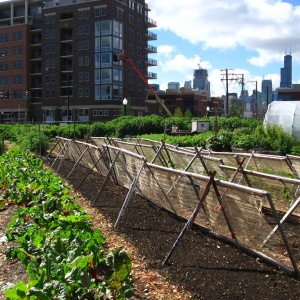
Targetting the food-energy-water nexus, this review by FCRN members Eugene Mohareb and Martin Heller and colleagues summarises the energy implications of various types of urban agriculture. The goal of their research is to identify resource efficiency opportunities while increasing urban food production.
The researchers are primarily concerned with the environmental implications of increasing urban food production. They find that, generally speaking, the life-cycle energy performance of urban food production may not be better than conventional food production; that said, attempts to better utilise the numerous urban waste streams (heat, wastewater, compost, etc.) could lead to more resource-efficient urban agriculture.
Abstract
There is an increasing global interest in scaling up urban agriculture (UA) in its various forms, from private gardens to sophisticated commercial operations. Much of this interest is in the spirit of environmental protection, with reduced waste and transportation energy highlighted as some of the proposed benefits of UA; however, explicit consideration of energy and resource requirements needs to be made in order to realize these anticipated environmental benefits. A literature review is undertaken here to provide new insight into the energy implications of scaling up UA in cities in high-income countries, considering UA classification, direct/indirect energy pressures, and interactions with other components of the food–energy–water nexus. This is followed by an exploration of ways in which these cities can plan for the exploitation of waste flows for resource-efficient UA.
Given that it is estimated that the food system contributes nearly 15% of total US energy demand, optimization of resource use in food production, distribution, consumption, and waste systems may have a significant energy impact. There are limited data available that quantify resource demand implications directly associated with UA systems, highlighting that the literature is not yet sufficiently robust to make universal claims on benefits. This letter explores energy demand from conventional resource inputs, various production systems, water/energy trade-offs, alternative irrigation, packaging materials, and transportation/supply chains to shed light on UA-focused research needs.
By analyzing data and cases from the existing literature, we propose that gains in energy efficiency could be realized through the co-location of UA operations with waste streams (e.g. heat, CO2, greywater, wastewater, compost), potentially increasing yields and offsetting life cycle energy demands relative to conventional approaches. This begs a number of energy-focused UA research questions that explore the opportunities for integrating the variety of UA structures and technologies, so that they are better able to exploit these urban waste flows and achieve whole-system reductions in energy demand. Any planning approach to implement these must, as always, assess how context will influence the viability and value added from the promotion of UA.
Reference
Mohareb, E., Heller, M. C., Novak, P. J., Goldstein, B. P., Fonoll, X., & Raskin, L. (2017). Considerations for reducing food system energy demand while scaling up urban agriculture. Environmental Research Letters.
You can find the paper here.
For more resources on urban agriculture on our website, please see here. Also, FCRN-member Professor Michael Hamm wrote a series of blog-posts on urban and regional food systems, in which he explores the value of city-region food systems, obstacles to their development, and possible ways forward. Read all parts in the blog-series by following Part I – Conceptualization, Part II – Who Will Farm?, Part IIIA – Scale and Production Strategy and finally Part IIIB - Scale and Production Strategy.







Post a new comment »